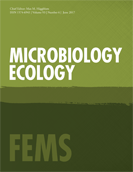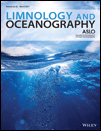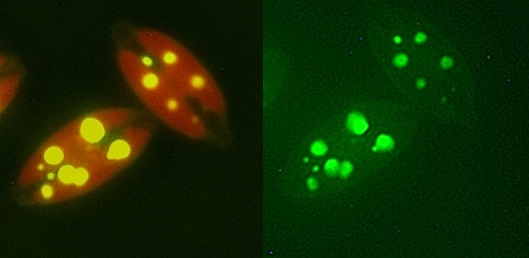In this study, we investigated the environmental impacts of scallop culture on two coastal estuaries adjacent the Bohai Sea including developing a quantitative PCR assay to assess the abundance of the bacterial pathogens Escherichia coli and Vibrio parahaemolyticus. Scallop culture resulted in a significant reduction of nitrogen, Chlorophyll a, and […]
Yearly Archives: 2017
In spite of challenging weather, the Duke Marine Lab hosted about 500 visitors for it’s 2017 Open House extravaganza. The Marine Microbe Group presented 3 exhibits including examples of ocean acidification, phytoplankton/algae in the coastal ocean and a demonstrating the large scale of production of microalgae for food and fuel. […]
The Duke Marine Lab joined the Beaufort NC July 4th parade to promote it’s upcoming open house. Lead by REU student Ford Fishman, the R/V Richard Barber was paraded through the streets to cheering residents and visitors alike!
ZIJ presented on the diversity and activity of Prochlorococcus at the OCB2017 summer meeting at WHOI in Woods Hole, MA. The presentation, “Ribosomal RNA and DNA (23S) of Prochlorococcus reveal variable activity and abundance relationships across taxonomic ranks” was based on a study with lead author and former student Alyse […]
Thraustochytrids are unicellular fungi-like (heterotrophic) marine protists and have long been considered to play an important role in the biogeochemical cycles of the coastal oceans. However, the significance of their ecological functions and diversity in marine ecosystems remain largely unknown. In this report, we examined the spatial and temporal variations […]
Trace metals and B-vitamins play critical roles in regulating marine phytoplankton growth and composition. While some microorganisms are capable of producing certain B-vitamins, others cannot synthesize them and depend on an exogenous supply. Therefore, external factors influencing vitamin synthesis, such as micronutrient concentrations, alter the extent to which B-vitamins are […]
On Saturday, April 1st, 135 middle school girls visited the Duke Marine Lab to take part in hands-on activities in the fields of microbiology, remote sensing, geographic information systems, environmental engineering, developmental biology, marine science, physics, and more. The goal of GEST is to expose girls to STEM opportunities and […]
Current high costs of commercial-scale algal biofuel production prevent the widespread use of this renewable fuel source. One cost-saving approach is the reuse of algae cultivation water after biomass harvesting, which reduces water pumping and treatment costs. However, dissolved compounds, cell debris, and microorganisms remaining in the water could affect […]
The fluorescent stain Nile Red has been used extensively for the quantification of lipids in phytoplankton, including microalgae, because it preferentially stains neutral lipids and it is economical and sensitive to use for screening purposes. Although its basic application has not changed for several decades, recent improvements have been made […]
Sarah and Courtney travelled to Durham on Saturday, February 25th to lead activities at the annual FEMMES Capstone event on main campus. FEMMES (Females Excelling More in Math, Engineering, and Science) is an undergraduate-led organization that seeks to provide STEM opportunities and role models to local female students. Hundreds of 4th-6th […]









